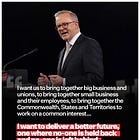There’s a fascinating clip going around today of the Week on Wednesday podcast saying some stuff about disability and UBI. As a podcast that’s representative of Labor’s views as a party, it offers an important insight into the party’s overall thinking, perspective and ideology, and in particular the predominant “labour-inclusive capitalism” viewpoint I discussed in my previous post:
In this post, I want to put aside the merits of the actual args. (Suffice to say, it’s certainly not an orthodox position by disability advocates that “disability doesn’t exist”.)
Instead, let’s look at the ideology and principles that these views spring from: They are perfect examples of labour-inclusive capitalism.
Remember that labour-inclusive capitalism is the idea that capital and labour aren’t inherently oppositional, or antagnostic, but that they should work together: That capitalism works best with labour inclusion, where workers and unions get a fair go and are thus willing participants who feel included in the process of capitalism.
Van’s conception of disability in the clip is emblematic of this. Not only is disability bad because it limits participation in capitalism, it’s defined in these terms!
We hear the example of somebody who is 55 and has “aged out of physical labour” - their disability is not that they have a bad back or any physical limitation per se, but that that limitation limits their workforce participation! Labour inclusion is harmed, capitalism is harmed, therefore it’s bad.
A UBI is ableist?
In the next part of the clip, Van is talking about barriers to participation, then suddenly veers off onto the topic of a UBI, calling it “ableist” and “exclusionary”. The sudden turn, and the use of these words to describe a universal payment seems strange, initially - but once you realize it’s driven from a labour-inclusive capitalism, it makes perfect sense.
It “structuralizes keeping people out of workplaces” (labour inclusion) and sabotages “the agency of having a job” (labour inclusion again!).
Where a left perspective sees employment as inherently exploitative and alienating, for the labour-inclusive capitalist, a job is agency, inclusion, and meaning.
Next, we are told employers will then be less likely to hire disabled people (out of pity), because of this UBI welfare safety net (because they’ll pity them less). Welfare here is a malevolent force - undermining the social contract between employer and employee, and thus the cause of, you guessed it, labour-inclusive capitalism.
This is a view that isn’t just a weaker version of somebody with more egalitarian or socialist views, it’s oppositional to it. Exploitation vs agency, universalism vs exclusion. These are oppositional, incompatible concepts.
A party united
Labor is often described as a broad church - and it’s true that its a big party with a wide range of views among its membership.
But among those that actually hold influence and power, and its aligned podcasts, labour-inclusive capitalism is supreme and dominant.
For those who believe in egalitarianism, or that freedom lies not in inclusion in the workplace but in liberation from its exploitation, labour-inclusive capitalism presents a problem.
Not only does a party of labour-inclusive capitalism work against the goals of egalitarianism, socialism, and universal welfare, but it teaches those sympathetic to those goals that better things aren’t possible.
Whether from inside or outside the party, Labor will never fundamentally be a party of egalitarianism until the dominant ideology of labour-inclusive capitalism is challenged. But the first step is simply to recognize it when you hear it.




I don't understand how labour-inclusive capitalism is the best explanation here given your definition of it on your previous post. It seems Van and co would have the same view if we had socialist economic institutions. Their view doesn't rely on any particular view of the ownership and control of capital in a society. Better explanation is that they think work is inherently good for a person, thats why they say disability “structuralizes keeping people out of workplaces” and undermines “the agency of having a job”. They don't see work as a means to the end of the general public good, they see it as good for the individual.